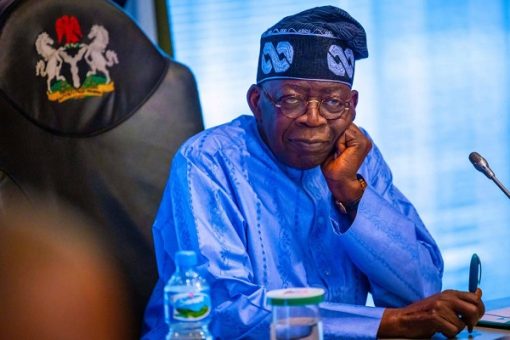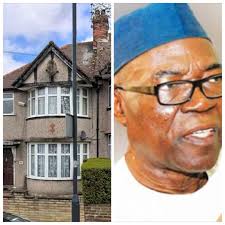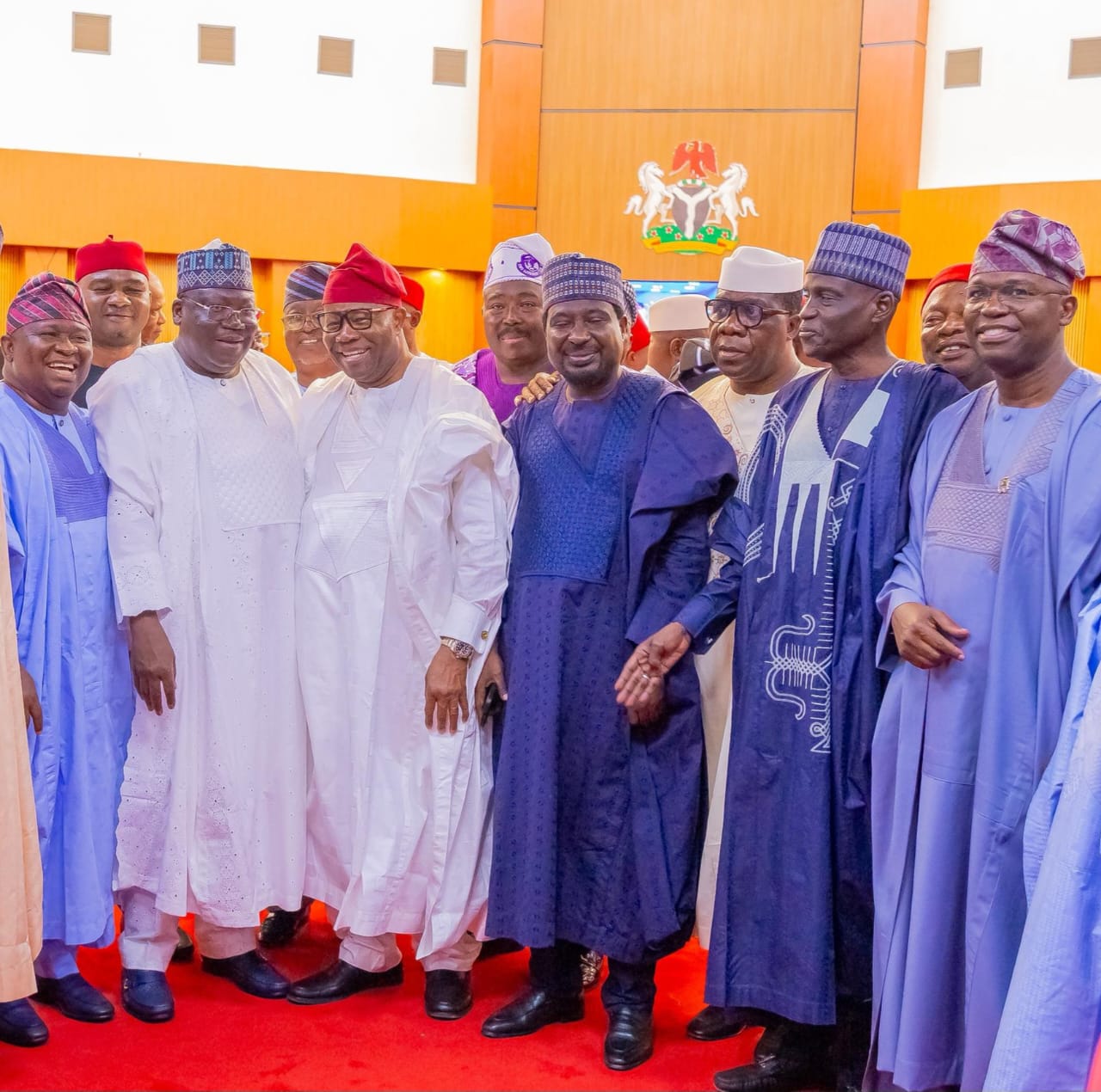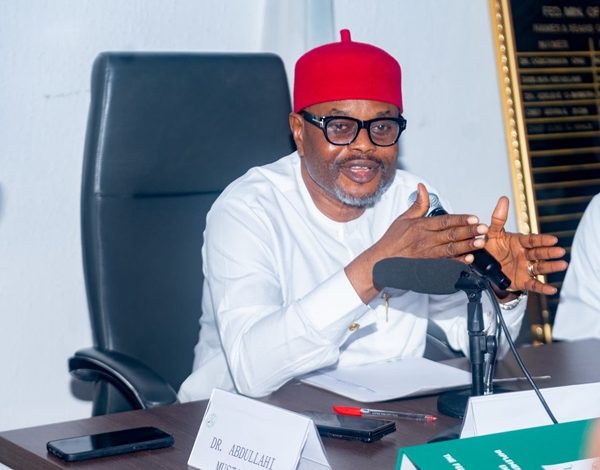Uncategorized
OF REFORMS, INSTITUTIONS, SOCIAL FAULT LINES, AND THE TINUBU DREAM TEAM

Striking a healthy balance between revenue and expenditure is one of the macroeconomic policy goals of government. To achieve this fiscal balance, policy interventions should be holistic and properly embedded in relevant institutions to maximize impact and ensure sustainability. Thus, economic reforms should, by necessity, consider the wider environment and the existing level of government fiscal discipline.
The Tinubu government may congratulate itself for its series of both fiscal and monetary reform initiatives, but its neopatrimonialism in spending remains challenging and uninspiring. The expected frugality has been missing, evident in clientelist dealings with institutions like the National Assembly, the Judiciary, and the Cabinet. The rising government expenditure on the National Assembly, the Judiciary, and the continuous maintenance of non-critical MDAs runs counter to the spirit of austere times. Reforms tend to become a basket case when the gains are expended on non-essentials, as demonstrated by the government in recent times.
Right Initiatives, Wrong Priorities
The government recently sent four Economic Stabilization bills to the Assembly for consideration, as part of Nigeria’s overall Fiscal Framework. They include: Nigeria Revenue Service, the Joint Revenue Board, Nigeria Tax Administration, and a Tax (taxation) bill. The government aims to achieve efficiency in tax administration and maximize revenue.
These plans hold promise but haven’t gone far enough to address the oversized and top-heavy governance setup. In its present form, fiscal reforms may struggle to succeed if the size of the executive and the legislature remain unreformed alongside fiscal intervention. Furthermore, the government’s high propensity to spend on non-essentials should equally be curbed.
Fiscal reforms only become meaningful if spending is prioritized. It’s like fetching water and filling a bottomless pit—a scenario that has characterized successive governments in Nigeria. The latest being the new, and ill-timed, “financial romance” between the executive and the Judiciary on one hand and between the executive and the Legislature on the other. Maintaining harmonious relationships among these branches is not the issue but rather the prohibitive cost of doing so, especially when government struggles to address critical challenges like mass youth unemployment, endemic poverty, infrastructure decay, and national insecurity. Nigerians are grappling with unprecedented economic hardships of late.
On a few occasions, hardships have forced the public to take to the streets, demonstrating and calling for the government’s attention to their plight. Understandably, given the prevailing cash crunch, the government could do little more than call for calm with a promise to “do something.”
That said, new policy measures arrived just as Mr. President took delivery of a customized aircraft and announced a 300% pay raise for judicial officers. He also embarked on constructing 40 units of luxury homes for their Lordships, perhaps to prevent their wigs from gathering cobwebs in their current “unbefitting” houses. Next year, 20 more units will be added. One really wonders who convinced the government that the stench in Nigeria’s Administration of Justice is caused by aging lavatories and leaking roofs in Justices’ homes. Nigerians are not finding this amusing.
The much-anticipated cabinet reshuffle failed to impress many. Highlights included the merger of two ministries into one: Tourism and Arts/Culture, now forming the Federal Ministry of Culture, Tourism, and Creative Economy. The exercise also involved reassigning 10 ministers, dropping five others, and appointing seven new ones. A new Ministry of Regional Development was created, alongside an earlier-established Ministry of Livestock.
Though commendable, these initiatives fell short in terms of depth and scope, leaving out governance institutional frameworks. Critical MDAs and even the Legislature’s operations should have been reformed. Economic policy reforms become more impactful and sustainable when carried out alongside repositioning relevant institutions, especially inefficient and over-bloated ones.
Cumbersome Cost Centers Left Out
The executive arm’s bloated size remains intact. With over 21 federal ministries and 45 ministers (including state ministers), it is undoubtedly top-heavy. When the President proposed a recent cabinet reshuffle, citizens expected him to reduce the number of ministries and ministers to save costs. Surprisingly, the number of ministries stayed the same (some were given new names), and the seven ministers dropped were replaced. Political considerations likely outweighed economic ones. Although Nigeria shouldn’t need up to 37 ministers, it has to, since the constitution requires each state, plus the FCT, to be represented. However, the number of ministries could be reduced to about 25, allowing some ministers to serve as “Ministers of State.”
A possible reform area also left unaddressed is the National Assembly (NAss). Despite the serious cash crunch, the government doesn’t seem ready to curb the massive national spending on the Nigerian Legislature. Intended primarily to enact laws and oversee government activities, the NAss has morphed into an implementation arm under the guise of Constituency Projects. The Assembly also burdens taxpayers with emoluments for nearly 2,570 legislative aides. Nigeria spends an average of N20 million monthly per member—among the highest worldwide. For instance, the office of the Senate President is entitled to 45 legislative staff, the Deputy Senate President to 30, the House Speaker to 33, the Deputy Speaker to 15, and Principal Officers to 10 each. The balance is distributed among the remaining members.
To make reforms more impactful, the government should address the above areas. The nation’s situation does not allow for half measures, especially given the over 60% multidimensional poverty rate, 20 million out-of-school children, 80% of national highways in disrepair, and power supply hovering around 5,000 MW for over 200 million people.
The Need to Move Beyond the Cosmetic
While the government should continue refining reforms, additional options could be explored. These include:
- Streamlining and merging some ministries. Nigeria needs no more than 25 ministries, as its key sectors should align with this number. Hundreds of specialized parastatals and agencies handle implementation, leaving ministries to focus on policy formulation, regulation, and advising the President. Yet, overlaps are apparent, such as between the Ministry of Trade and SMEDAN regarding IDC management, or the Labour Ministry and NDE in skills training.
Proposed mergers might include:
- Science and Technology with Education
- Housing and Urban Development with Works, as states play a greater role in housing development
- Blue Economy with Water Resources and Sanitation
- Aviation with Transportation
- Steel Development with Power
- Special Duties and Intergovernmental Affairs to be handled by a Presidential Liaison Officer
- Police Service Commission should be subsumed by the Ministry of Police Affairs, or vice versa.
Another reform area is reducing the number of ministers to improve cost-effective efficiency.
- Reducing legislative aides. Cutting down the nearly 3,000 legislative aides by half and removing Constituency Project budget provisions would help members focus on lawmaking and oversight while reducing corruption in the National Assembly.
- Enhancing oil and gas security. The government should address oil bunkering in oil-producing areas, starting with complicit security personnel. With over 400,000 barrels per day lost to theft, a substantial economic threat persists. Security should be bolstered, possibly through foreign expert firms, as done in Angola.
- Reviewing salary structures. Harmonizing disparities in public service pay structures could improve morale and productivity. The extensive pay gaps between civil servants in ministries versus revenue-generating establishments like CBN and NNPC are difficult to justify.
Overburdened, Weak Economic Base
The suggested reforms may seem daunting, but Nigeria’s history of imprudence and poor economic state leaves limited options. A decade ago, then-CBN Governor Sanusi Lamido Sanusi claimed that running the National Assembly cost Nigeria nearly 25% of the national budget. Assembly members contested this, asserting a 3.5% budget allocation. However, a more realistic figure, including Constituency Projects, may hover around 10%.
Given these conditions, President Tinubu should leverage his authority to navigate Nigeria away from a looming economic crisis. His administration has an opportunity to lay a solid economic foundation but must avoid ethnic-based appointments at the expense of national interest.
Uncategorized
London Property Dispute Exposes Alleged Corruption, Forgery by Nigerian Politician and Lawyer

By Hassan Taiye
A recent judgment by the UK’s First-tier Tribunal (Property Chamber) has shed light on a complex web of alleged corruption and forgery involving a Nigerian politician and a senior lawyer. The case revolves around a disputed property in North London, valued at 79 Randall Avenue.
The property was purchased in 1993 under the name “Tali Shani,” which is allegedly an alias for late General Jeremiah Useni, a powerful member of the Abacha regime. Chief Mike Ozekhome, SAN, claimed the property was gifted to him by “Mr. Tali Shani” in 2021 as payment for legal services. However, the tribunal dismissed this claim, describing it as “fabricated” and “fraudulent.”
The tribunal’s ruling highlights the alleged involvement of Ozekhome and his associates in fabricating documents, including a Nigerian passport, National Identification Number (NIN), and Tax Identification Number (TIN). The NIN was reportedly created remotely from Monaco using a non-compliant photograph and bypassing biometric requirements ¹.
The Human and Environmental Development Agenda (HEDA Resource Centre) has petitioned the Independent Corrupt Practices and Other Related Offences Commission (ICPC) to investigate Ozekhome and others over alleged fraud, forgery, and unlawful attempt to acquire the London property. The ICPC has launched an investigation, and the Attorney-General of the Federation (AGF) has also taken notice of the case ²
Chief Mike Ozekhome, SAN Senior lawyer accused of forgery and attempting to acquire the property through fraudulent means.
General Jeremiah Useni Late Nigerian General allegedly behind the purchase of the property under the alias “Tali Shani.”
Osilama Ozekhome*: Ozekhome’s son, implicated in the alleged forgery and fraud.
Uncategorized
photo

L-r Senate Committee Chairman on Appropriation, Solomon Adeola; Senate Deputy Whip, Onyekachi Nweboyin; Former Senate President, Ahmad Lawan; President of the Senate, Godswill Akpabio; Senator Sharafadeen Ali; Deputy Senate President, Jibrin Barau; Senate Leader, Opeyemi Bamidele; Senate Whip Tahir Monguno and Senate Committee Chairman on Financial Institutions, Tokunbo Abiru, after resumption of plenary yesterday. Photo: Senate President’s Office
Uncategorized
BREAKING: Tinubu’s Minister, Uche Nnaji, Resigns Amid Certificate Forgery Scandal

By: Fabian Apechihin
The Minister of Innovation, Science and Technology, Uche Nnaji, has resigned from President Bola Ahmed Tinubu’s cabinet amid a growing controversy surrounding his academic credentials.
Presidential spokesman Bayo Onanuga confirmed Nnaji’s resignation in a statement issued late Tuesday.
Nnaji’s exit follows mounting allegations that his academic certificates were forged. Investigations revealed that the University of Nigeria, Nsukka (UNN), disowned the Bachelor of Science degree he claimed to possess, stating that he never completed his studies at the institution and was therefore not issued any certificate.
According to UNN Vice-Chancellor Prof. Simon U. Ortuanya, Nnaji was admitted in 1981 but failed to meet the requirements for graduation.
In a related development, the National Youth Service Corps (NYSC) reportedly disowned the certificate of national service presented by Nnaji, describing it as fake.
His resignation marks the latest in a series of controversies to hit the Tinubu administration over questions of integrity and accountability among public officials.
-

 Uncategorized5 years ago
Uncategorized5 years agoFG, states urged to harness flooding for ranching, others with technology – Agbaje
-

 Headlines10 years ago
Headlines10 years agoBreaking: EFCC seals Borno House of Assembly, as Hon members take to their heels
-

 News11 years ago
News11 years agoNigeria Security Operatives Stage Manhunt For Homosexual Perpetrator
-

 News9 years ago
News9 years agoHow 21-year-old Girl fled community over accusation of lesbianism
-

 News10 years ago
News10 years agoYobe Gov Moves Against Deputy
-

 Opinion6 years ago
Opinion6 years ago7 signs she has friend zoned you
-
Technology4 years ago
Online job placement company headhunts women
-

 Headlines9 years ago
Headlines9 years agoBorno Dep Gov Abducts Another Church Leader





